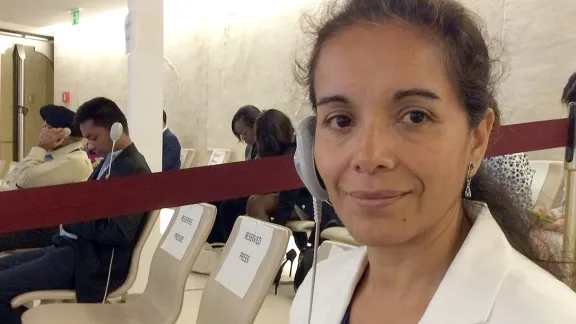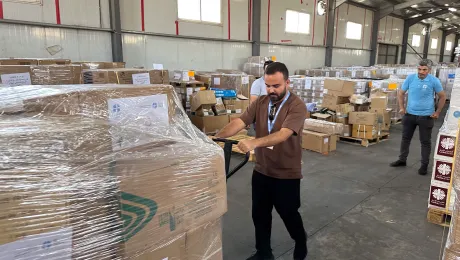
Rev. Dr Patricia Cuyatti, LWF area secretary for Latin America and the Caribbean, before the start of the UPR session on Nicaragua, 18 September, in Geneva. Photo: LWF/M. Spangler
(LWI) - The Lutheran World Federation (LWF) has warned the United Nations Human Rights Council (UNHRC) that multiple human rights violations against indigenous people living on the Caribbean Coast of Nicaragua violate their economic, social and cultural rights.
In an 19 September statement to the council on behalf of the LWF, the Center for Justice and Human Rights of the Atlantic Coast of Nicaragua and the Humboldt Center, Rev. Dr Patricia Cuyatti, LWF area secretary for Latin America and the Caribbean, urged Nicaragua to respect the rights of indigenous people.
Submitting the statement on behalf of the three organizations, the LWF representative said Nicaragua had failed to deliver on the decision of the Inter-American Court of Human Rights and reform the country’s electoral act to help indigenous peoples better participate in the country’s electoral process by taking into account their traditions and customs.
“The current government maintains absolute hegemony in all spheres of power, creating paperwork procedures that hinder indigenous people [from attaining] the political participation in the political process,” said the joint statement to the UNHRC 27th regular session, taking place in Geneva, 8-26 September.
The LWF intervention came during the Universal Periodic Review (UPR) on Nicaragua, a time for states to articulate what progress they have made in the area of human rights. Eight non-governmental organizations raised questions on the rights of women and children, gender-based violence and torture.
The submission was the only one focusing on the voices of indigenous peoples. Representatives from various nations commended Nicaragua for its commitment to ending poverty, improving education and the rights of women. Nicaragua’s report was adopted by the council.
The LWF official said, however, that the indigenous people of the Caribbean Coast of Nicaragua continue to suffer harassment and intimidation by non-indigenous people who are encroaching on indigenous land and exploiting their natural resources.
The government of Nicaragua, the statement added, has announced the start of a number of mega-projects including the Grand inter-Oceanic canal project that will have a major impact on indigenous territories.
The UPR session heard that “These projects were carried out without prior, free and informed consent from the affected indigenous peoples.”
As a consequence of the human rights violations against them, the “indigenous peoples of the Caribbean Coast of Nicaragua today are living under harsh economic conditions characterized by impoverishment, segregation, marginalization, assimilation, oppression and exploitation.”
The LWF called on the Nicaraguan government to stop the “process of demarcation and titling of indigenous territories” and the illegal activities in the territory that are infringing on the rights of indigenous people.
The statement also urged Nicaragua to implement the International Labor Organization’s Convention 169, which calls on governments to respect the collective rights of indigenous people, in compliance with the national laws and the UN Declaration on the Rights of Indigenous Peoples.
The Nicaraguan government stated that it has a broad framework that ensures human rights in the country, rejecting challenges made by indigenous people and their supporters that their rights are being violated.
The LWF works in Nicaragua through the Department for World Service regional program in Central America, and through its member church, the Nicaraguan Lutheran Church of Faith and Hope.


